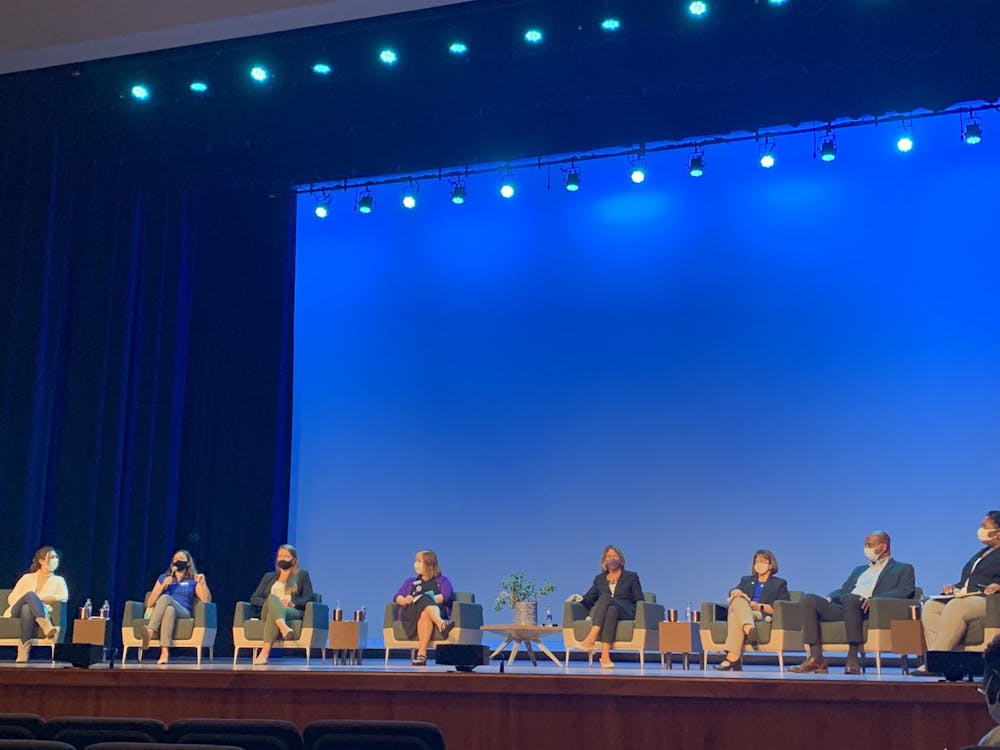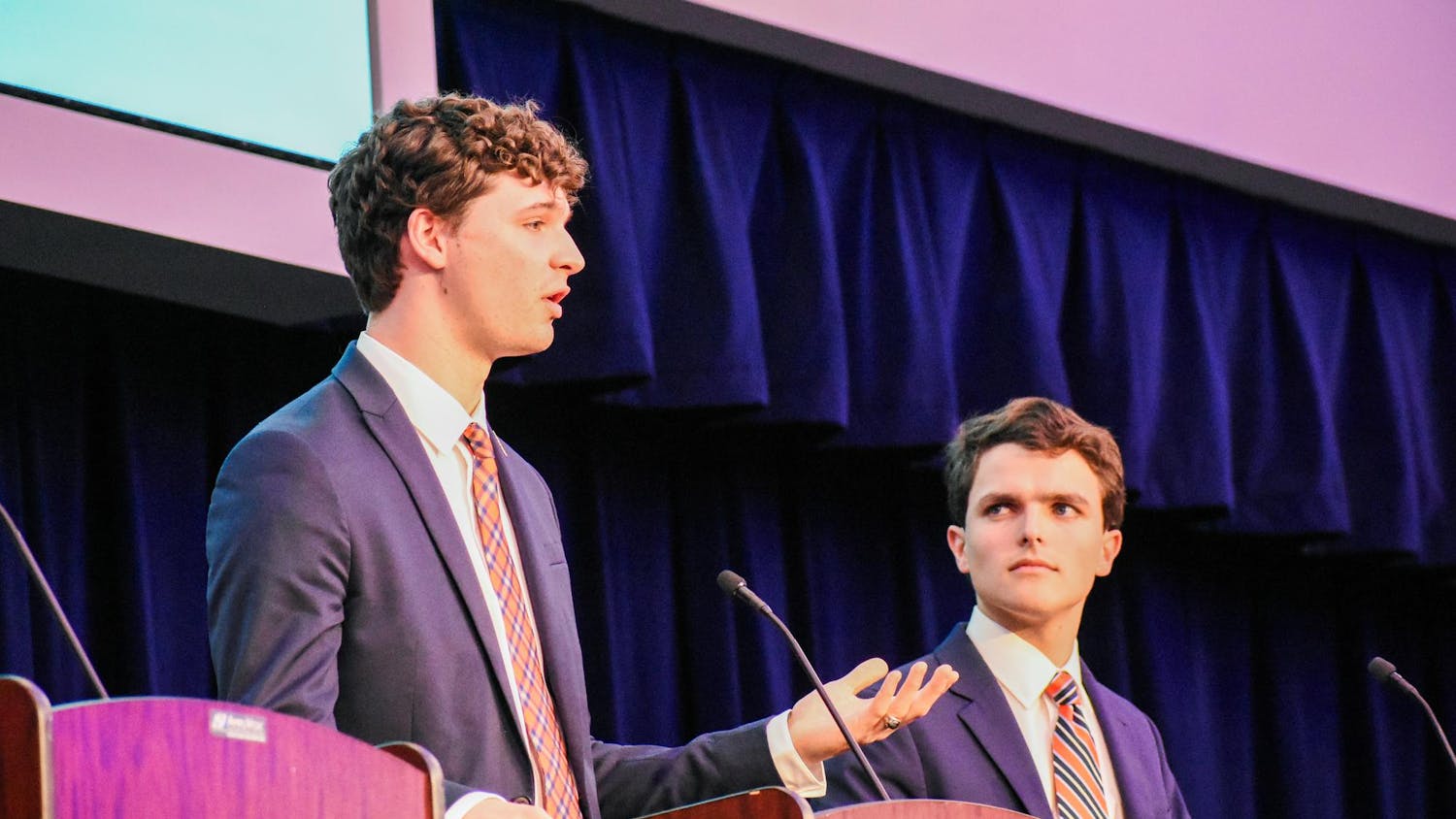Auburn University Student Affairs hosted a Town Hall to address recent issues surrounding preventing and reporting sexual assault on Wednesday, Sept. 22.
“We want to make sure you feel safe on our campus,” said Bobby Woodard, senior Vice President of Student Affairs. “That is our number one priority.”
Three recent assaults on Auburn’s campus — one in a residence hall, one on a campus sidewalk and one in a fraternity house — have intensified emotions among both students and administration. In all three cases of assault, each survivor chose not to file a police report or a formal complaint with the University.
The town hall began at 4 p.m. in the Student Activities Center Auditorium and was also streamed via Zoom. Representatives from Student Affairs, Campus Safety and Security, Health Promotion and Wellness, the Auburn Police Division, the Student Government Association and Title IX attended.
Gheni Platenburg, assistant professor of journalism, served as the moderator for the meeting and began by asking the panelists questions gathered by SGA members through a survey of the student body.
Timely warnings
Susan McCallister, director of Campus Safety and Compliance, began by explaining the process of receiving a notice of sexual assault and how a timely warning is sent out. McCallister listed the police, the Title IX office and around 1,500 people across campus who are considered Campus Security authorities as sources Campus Safety receives reports from.
“We have a list of specific crimes that we send notifications out for, and they're major crimes — generally, crimes of violence,” McCallister said. “And then [we assess] if it poses a serious or ongoing threat to people on campus. … That's a very hard determination to make a lot of times with the limited information that we have, and we err on the side of caution if it's not really a clear-cut situation.”
Reporting sexual assault
Katherine Weathers, senior deputy Title IX coordinator, said that since August 2020, there have been 64 reports of sexual assault. Of those, 27 did not name the perpetrators and two did not name the victim. Nineteen reports that listed a perpetrator listed someone unaffiliated with the University.
“If we get the name of a victim, we reach out to that person 100% of the time,” Weathers said.
Of the 64 that the Title IX office reached out to, 18 responded. Currently, Weathers reported that there are two ongoing sexual assault investigations.
Clarence Stewart, assistant chief of the Auburn Police campus precinct, said that out of the 18 that responded to Title IX, only seven cases were taken to the district attorney. He attributed this to the feelings of guilt or fear of repercussions that many survivors face.
“We have to understand that, that when someone has been subjected to this type of situation … it's not like on TV,” Stewart said. “They're not always going to call the police."
Weathers, McCallister and Stewart all emphasized the importance of filing an official report while acknowledging the difficulty survivors experience in doing so.
Weathers stressed that reports help Auburn, as a university and a city, hold people accountable and create a history of the perpetrator that police can keep tabs on and refer to in the future.
“Another good reason for people to file a report is it helps us understand really what the problem is and the extent of it so that we can better address it,” McCallister said.
Resources for survivors
The panel members went on to highlight several resources available to students such as Safe Harbor, Green Dot, Auburn crime logs and Student Counseling and Psychological Services. Joeleen Cooper-Bhatia, licensed psychologist with Student Counseling and Psychological Services, said that their “trauma-informed” clinicians are particularly trained to avoid retraumatizing the survivors who walk through their doors.
Bridget Nelson, graduate assistant in the Office of Health Promotion and Wellness, pointed to the preventative resources provided by Green Dot for students who feel unsafe right now. In addition, Judith White, coordinator for violence prevention and advocacy in HPWS, mentioned the open arms provided by Safe Harbor, a place where students can go when legal options seem overwhelming.
Open Forum
The panel then took questions from students in attendance. McCallister addressed an issue in which a security shuttle did not show up and recommended that in such a case, the student call the Campus Safety main line at 334-844-8888.
Additionally, Grace Cox, president of “It’s On Us," a national program for sexual assault education and prevention, said the University is working on revamping online sexual assault training programs, aiming to make them mandatory, in-person discussions.
Weathers further explained the process of forming terms of agreement, which some survivors may choose to arrange with the assistance of the Title IX office to maintain boundaries and rules concerning their interaction with the perpetrator. One student was concerned about what would happen if the perpetrator did not agree to the survivor’s terms and conditions. Weathers said that in almost every circumstance, the perpetrator will be forced to comply, as stated in the Student Code of Conduct.
Another student wanted to know why so many rape kits go untested — citing statistics which show thousands of kits sitting in police storage nationwide — and asked that APD release the number of untested rape kits currently in their possession.
Stewart said there are zero untested rape kits in APD's possession. The only kits left untested are "Jane Doe kits," he said, which are kits filed by survivors who choose to remain anonymous. He said the police cannot receive kits from the hospital unless an official police report has been filed, which may explain the high numbers being reported.
Nelson added that every survivor has a 72-hour window to complete the kit and a 90-day window to make a decision on whether they want to pursue the case with the police.
Near the end of the meeting, Stewart asked the panel what the University and police are doing to address the problem of sexual assault, shifting focus from reacting to assaults to trying to prevent them in the future.
“What are we going to do to address the underlying problem?” Stewart said. “We’ve been reactive enough.”
The meeting adjourned at 6 p.m. New crime statistics, including any cases of rape, assault and other crimes required to be reported under the Clery Act, will be published through the University's Annual Security and Fire Safety Report by Oct. 1.
Do you like this story? The Plainsman doesn't accept money from tuition or student fees, and we don't charge a subscription fee. But you can donate to support The Plainsman.





